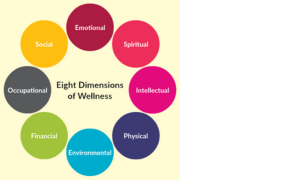
Dec 31 2024.
views 266With it being the last day of the year, promises to do better and be better linger on lips. There is constant chatter about resolutions and aiming higher. Daydreams about how one yearns to be the best version of themselves and how they can improve - whether they discuss it or keep it to themselves.
They want to ditch the fast food, hit the gym and wake up on time. They want to prepare for that promotion and maybe learn a new language. Some of them exclaim “I’m planning to buy my dream car this year!” while some others are looking to focus on self-care.
What if I told you these were all examples of wellness?
Embarking on a wellness journey means working towards fulfilment and challenging one’s potential in order to bring about growth. Shifting your focus to wellness can result in you thriving and enjoying all aspects of life, instead of living day to day on a soulless hamster wheel.
A majority of experts have stated that there are eight dimensions of wellness that can contribute to an individual’s overall state of well-being. They are classified under emotional, environmental, financial, intellectual, occupational, physical, social and spiritual wellness.

There is no necessity for all these dimensions to be equal to one another, rather, adjusted according to your own preferences, to bring about a collective sense of balance and harmony that conforms with your own core values and what you seek in life.
Let’s explore the 8 different dimensions of wellness along with how you can incorporate some of them into your life as the New Year dawns.
Emotional wellness
Emotional wellness refers to the ability to understand and interpret your feelings and emotions as you encounter different challenges, as well as to cope with life stressors. It includes having the ability to experience and express a range of emotions, handle stress and act accordingly in terms of crisis.
If you are looking to improve your emotional wellness:

Environmental wellness
This includes understanding how your lifestyle impacts the environment around you and living in a way that promotes good health and well-being by creating a pleasant personal environment, as well as being considerate of the nature around us.
You can improve on this aspect by:
Financial wellness
Financial wellness is the ability to successfully manage your budget and resources according to your current and future financial needs. It is not just about how much you earn but rather your ability to understand your means and make informed decisions accordingly.
To improve in this aspect, you can:

Intellectual wellness
This includes the ability to think critically and creatively, in addition to actively seeking out new ideas and information. It focuses on expanding your knowledge, skills and experiences, encouraging you to embrace being a student of life. It is known to positively affect your mental health and cognitive functions allowing you to aptly navigate challenges.
Some ways to improve intellectual wellness include:
Occupational wellness
Achieving the right work-life balance is crucial when it comes to upholding a sense of positive well-being. Occupational wellness refers to the personal satisfaction one gets from a career or volunteer experience. It also includes the ability to balance work and rest in a way that promotes health, personal satisfaction and financial well-being.
You can improve on this aspect by:
Physical wellness
In addition to taking precautions to avoid potential diseases, physical wellness includes taking care of your body to keep it healthy and functioning in the best possible way. Adapting certain behaviours that promote this wellness as well as appreciating your body can greatly improve your overall well-being.
Some ways you can improve in this aspect include:

Social wellness
This involves the ability to form and maintain healthy social relationships with others, which is crucial for cultivating trust, improving communication and nurturing support between individuals and communities. It is a fact that no man is an island, therefore, building healthy connections with those around us will ultimately have a positive effect on our wellbeing.
To improve social wellness, you can:
Spiritual wellness
This is not only limited to religion but is rather the practice of developing a sense of purpose in life and fostering a connection with something greater than yourself. It involves a set of values, beliefs and principles that can guide you to make important decisions. It can also be where you get your strength and peace from when the going gets rough.
Some ways you can improve in this aspect include:
Change is not easy, especially when we’ve been tied to our routines and habits for months, sometimes even years. It can take a while and you might stumble a few times in the beginning. However, the effort is worthwhile and made easier as you prioritise self-awareness towards your habits and lifestyle. The clues for where your strengths lie in the dimensions of wellness and what aspects you need to address will pop up once you take a quick look at your current lifestyle.
Wellness is a flexible and personalized approach to living life in a way that allows you to become the best kind of person that your potential and circumstances determine for you. This New Year, amidst the fireworks and celebrations, take a moment to reflect on the growth, experiences and opportunities you would like to consider for your future.
Will you wallow in the past regretting the pain of a lost year? Or are you going to embrace the present and make decisions that will eventually grant you ease tomorrow?
Don’t worry about getting it right the first time, but about getting started. Before you know it, the Earth would’ve passed another revolution around the Sun and you’ll be celebrating another New Year, but this time, you’ll be celebrating yourself as well. This time, make it different.
0 Comments